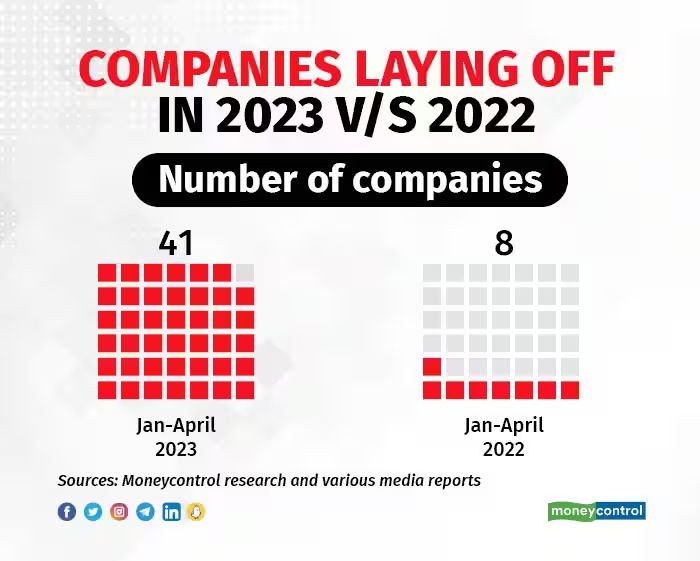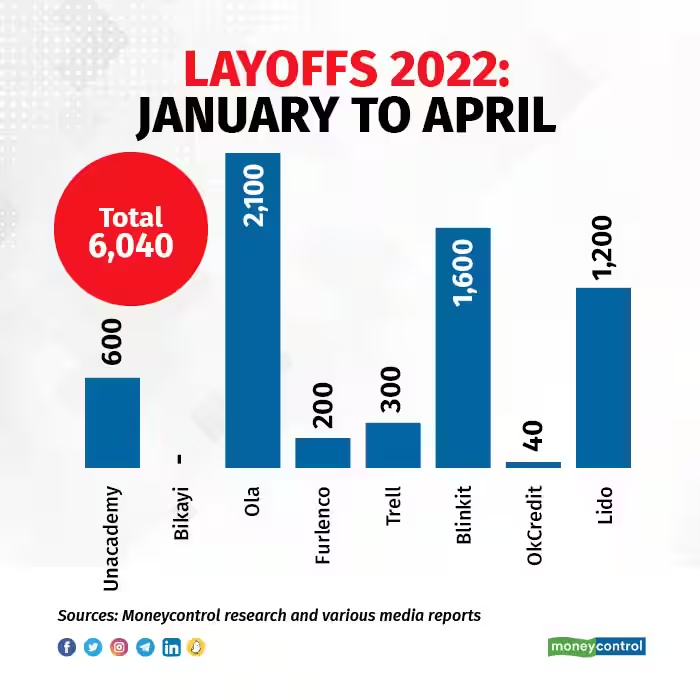41 Indian Startups Downsized in 2023 Compared With 8 in 2022

Image Used for Representational Purpose Only
Indian startups have been cutting costs and aiming for profitability due to decreased funding from private equity and venture capital investors.
Around 5,868 employees were let go by 41 startups in the first four months of 2023, compared to eight startups that downsized by letting go of 6,040 employees during the same period in the previous year.

The decrease in funding is caused by several factors, including elevated inflation, rising global interest rates, the spectre of a recession in the West, and the war in Europe, which disrupted supply chains.
Funding for India's startups in Q1 2023 dropped to one-third of the level in the same period last year, with investors participating in 122 rounds and investing about $3.6 billion in March alone, compared to $5.69 billion invested in 406 funding rounds in the year-ago period.
Startup founders in India are now prioritising positive unit economics and a clear path to profitability to become eligible for investment, leading to burn moderation, growth expectation reevaluation, business model pivoting, and, in some cases, acquisition or closure.
Staff downsizing has become a common decision for companies, with nearly 90 Indian startups letting go of 24,200 employees since the start of 2022.

In contrast, in 2021, startups in sectors such as education and technology hired aggressively. They incurred high employee costs to sustain growth, with edtech being a sector where employee costs are the most significant expense.
The five edtech unicorns that filed FY22 results, including Unacademy, PhysicsWallah, Vedantu, Eruditus, and upGrad, collectively spent about Rs 5,465 crore on employees, a 47% increase from the previous year's expenditure of nearly Rs 3,724 crore.
Meesho, an e-commerce unicorn based in Bengaluru and backed by SoftBank, has announced its third round of layoffs in just over a year.
The company has let go of 251 employees, which is around 15% of its total team strength, in a bid to achieve sustained profitability with a leaner organisational structure.
Meesho had previously fired 150 employees in April 2022 after rebranding its grocery arm from Farmiso to Superstore and another 300 people in August as it announced the closure of its grocery business.
The edtech sector, a prominent player in India's startup boom in 2021, has accounted for more than half of the total layoffs since the start of 2022.
Around 10,700 people have been laid off by startups in this sector due to decreasing demand for online learning and reduced funding from private equity and venture capital firms.
Skill-Lync, an upskilling startup for engineering students and graduates, is the latest edtech company to join the list of startups laying off employees.
The company has let go of 400 employees, citing tough macroeconomic conditions. It has consolidated operations in Chennai, Bangalore, and Hyderabad, with only corporate teams operating from Pune and Delhi, further reducing headcount.
Like Skill-Lync, many startups are feeling the effects of the post-pandemic slowdown in demand and the challenging funding environment.
Scaler's CEO, Abhimanyu Saxena, said the company is trying to navigate the funding situation by adopting a frugal approach and avoiding hypergrowth.
He added that the company would continue to grow sustainably but not aim for massive topline growth.
According to Gaurav Damani, co-founder of investment firm Sequoia Capital India Surge, while revenues are not contracting, the pace of growth has slowed down for many companies.
He explained that companies had hired people in anticipation of a certain level of demand, and when that demand didn't materialise, they had to lay off employees.
Damani emphasised that the differential between expected and actual growth is significant and requires companies to adjust their growth expectations and operations accordingly.
Get the latest reports & analysis with people's perspective on Protests, movements & deep analytical videos, discussions of the current affairs in your Telegram app. Subscribe to NewsClick's Telegram channel & get Real-Time updates on stories, as they get published on our website.
























